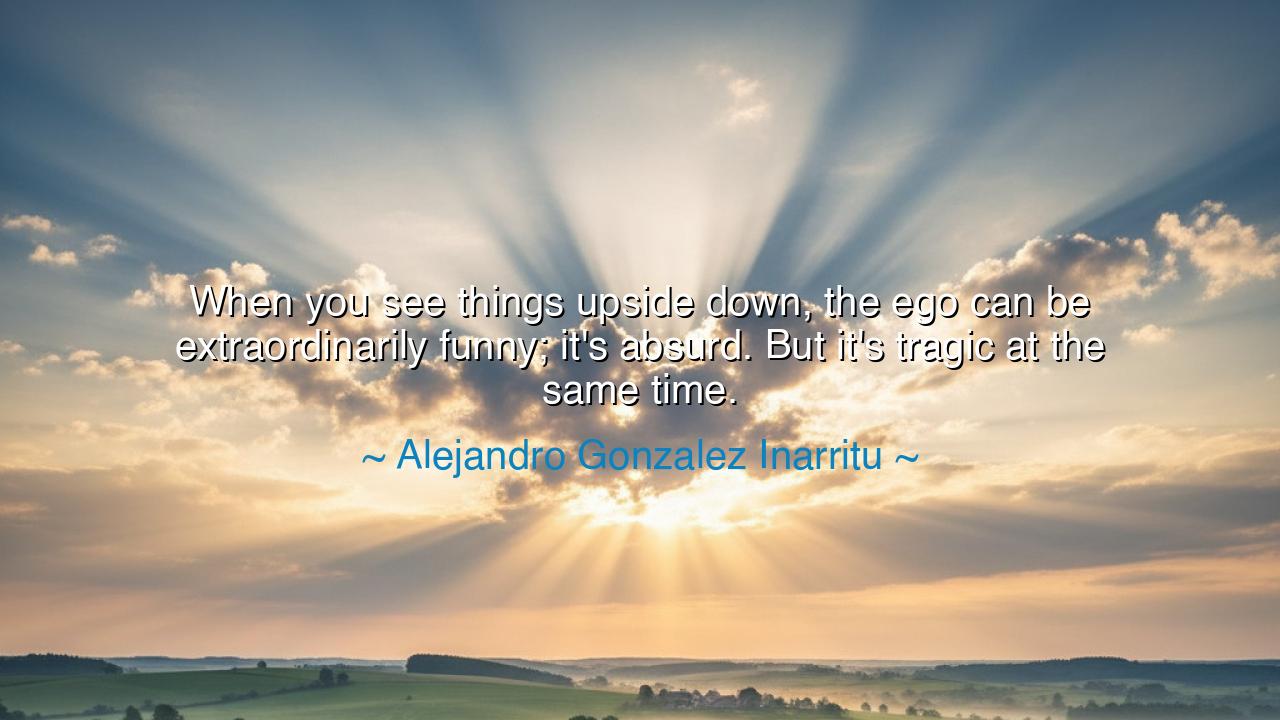
When you see things upside down, the ego can be extraordinarily
When you see things upside down, the ego can be extraordinarily funny; it's absurd. But it's tragic at the same time.






The words of Alejandro González Iñárritu—“When you see things upside down, the ego can be extraordinarily funny; it's absurd. But it's tragic at the same time.”—speak to the paradox of human nature, to the strange duality that binds our foolishness and our suffering together. Beneath these words lies an ancient truth: that the ego, though it drives our ambition and fuels our identity, is also the source of our blindness, our comedy, and our sorrow. Iñárritu, a storyteller of immense depth, whose films explore the fragility of existence and the illusions of the self, reminds us that to view life from another angle—to see it “upside down”—is to awaken to the ridiculous theatre of human pride. Yet in that laughter, there is also compassion, for the joke is on all of us.
When he says that the ego is funny, he points to the absurd spectacle of our endless striving for control, fame, importance, and certainty in a universe that owes us none. We take ourselves so seriously—our titles, our rivalries, our vanities—and yet from a distance, all this appears like a cosmic comedy. The ancient philosophers called it the “dance of shadows.” Like actors forgetting their lines, we cling to our imagined roles, mistaking illusion for truth. Iñárritu’s wisdom lies in this: that once you see through the mask of ego, you cannot help but laugh, because what once seemed grand now appears small and absurd. But his laughter is not cruel; it is the laughter of understanding—the laughter of one who has seen both the folly and the fragility of being human.
Yet, he reminds us that this comedy is also tragic, for the ego’s delusion is not harmless—it costs us love, peace, and unity. The same force that makes us absurd also makes us suffer. Our endless hunger for validation isolates us; our desire to appear strong robs us of tenderness. It is the tragedy of Oedipus, who blinded himself with truth only after living blind in pride. It is the tragedy of every empire that rises on arrogance and falls to its own shadow. The ego builds monuments, yet cannot bear silence. It conquers others but remains a stranger to itself. This is why Iñárritu’s words cut deep: because he has seen that behind the laughter at human folly lies the sorrow of wasted grace.
In this reflection, there echoes the ancient teaching of Lao Tzu, who said, “He who knows others is wise; he who knows himself is enlightened.” To see one’s ego “upside down” is to turn perception inward, to behold oneself without illusion. When the warrior first sees his own pride, he laughs, for he realizes how childlike his vanity was; but then he weeps, for he understands how much of life he has lost chasing smoke. This is the transformation Iñárritu speaks of—the awakening that comes when the mirror shatters and the self is seen clearly. It is not the destruction of identity, but its purification.
Consider the story of King Canute, who ruled England and Denmark in the 11th century. His courtiers flattered him as a god who could command the seas. To teach them—and himself—a lesson, he ordered his throne set upon the shore and commanded the tide to halt. Of course, the waves ignored him. When the water reached his feet, Canute laughed at the folly of men who think themselves masters of nature. But there was tragedy, too, in that moment: the recognition of how easily power blinds the heart. Iñárritu’s words reflect this same truth—that to see the ego’s absurdity is both liberating and humbling. It teaches us to laugh at ourselves, yet also to mourn the distance between what we are and what we pretend to be.
In Iñárritu’s films—Birdman, Babel, The Revenant—the ego is not an enemy to be destroyed, but a mirror to be understood. His characters are dreamers, artists, and wanderers trapped in their own illusions. Their journeys are not toward victory, but toward humility. Through their pain, he reveals that freedom comes not from triumph, but from awakening. When the self finally sees its own absurdity, pride dissolves, and compassion is born. For how can one look upon the fragility of the human heart and not forgive it? How can one see the clown and not recognize the poet within him?
From this wisdom, we may draw a lesson for our own lives: learn to laugh at your ego, and you will rob it of its power. When anger swells, when vanity blinds, when the need to be right consumes you—step outside yourself. Turn your view “upside down,” and see how small these storms truly are. The one who can laugh at himself is invincible, for he has nothing left to defend. The one who can see his own absurdity walks in peace, for he understands that every soul is caught in the same comedy.
So, my friends, let Iñárritu’s teaching be your mirror: look upon your own pride with both laughter and mercy. See your ego not as an enemy, but as a mischievous child that must be understood, not obeyed. For the truth of existence is both absurd and sacred, funny and tragic, divine and human. When you can hold both in your heart—when you can laugh through tears—you will have found the balance of wisdom. Then, like the ancient sages, you will walk lightly upon the earth, smiling at its folly, yet loving it all the same.






AAdministratorAdministrator
Welcome, honored guests. Please leave a comment, we will respond soon